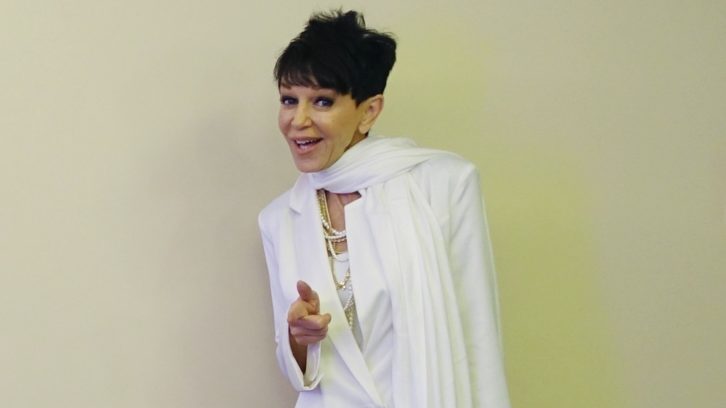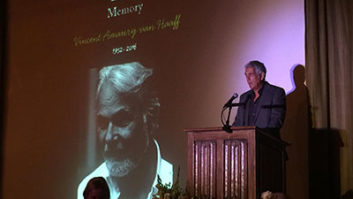
 This was Mix’s 19th most-read article of 2022!
This was Mix’s 19th most-read article of 2022!
Most of you won’t recognize the name in the headline, but a great many of you will.
The professional audio, recording and music industries lost a true treasure with the passing of Lisa Roy, a day before the new year. She danced mostly behind the scenes in a behind-the-scenes industry, often uncredited and often as a volunteer. At the same time, she had no problem strutting a red carpet, and she could do it in style.
This isn’t an obituary. I don’t know the details, and though I’ve known Lisa for 30 years, I wouldn’t even attempt to guess when she was born. A summary of her many and varied accomplishments will follow, and she accomplished a helluva lot, across every segment of professional audio and recording.
Lisa adopted dozens of roles—studio manager, artist relations, record label, audio education, studio design, marketing, promotion, event planning, tour management, advertising, hospitality and everything in between—before settling into marketing and public relations through a long-time partnership with her dear friend Robbie Clyne and the establishment of her own Rock and Roy Entertainment.
That list would sound so “official” to Lisa. She always just did what she did, and it didn’t matter if it was in London, New York, Nashville or her adopted hometown, Los Angeles. One year, she’d be walking through NAMM with Billy Bob Thornton looking for guitars, and the next, you could find her escorting Thomas Dolby to the podium for his AES Keynote Speech.
She might be at Fab Dupont’s rooftop AES NYC party, up past midnight in October, then six months later hosting a dinner at the Full Sail Hall of Fame induction ceremony in Orlando. In May, you might have found her leading a tour through Hank Neuberger’s Springboard Productions streaming audio truck at Coachella. She and Hank went way back.
In January-February, it was Grammy time. From the P&E Wing party at the Village on Tuesday, through a dozen or more backstage tours during the week, and well past shutting down the Music Mix Mobile trucks on Sunday night, ending in a late-night drink to celebrate with Joel, Eric, John and the rest, she and her co-conspirator, Robbie Clyne, were tireless and gracious hosts to a rotating crop of journalists and industry groups.
More than once, all 5-foot-4 and 100 pounds of Lisa would serve as Phil Ramone’s bodyguard/escort, weaving through an industry event with grace and style, in 5-inch heels with a boa and a hat.
Every year, she could be found at one or another industry event, wending her way through the aisles trailed by the executive team from Audio-Technica Japan and absolutely beaming as she introduced them to her friends. My heart goes out Mike, Gary, Roxanne and all the good folks in Stow, Ohio. I know that she was part of the family.
To me, a long-time editor, Lisa was the Great Connector. Engineers, producers, artists, designers, manufacturers, CEOs, assistant engineers, studio managers, the head of the Berklee College of Music, right on up to Dave Grohl, Reba McEntire or the great Quincy Jones. If I ever needed a contact that was hard to get, no matter how obscure, how famous or how last-minute, I called Lisa.
There have been more than a few deaths in the pro audio community these past couple of years, and they are all deserving of remembrance. But when Kim Pelonis called on New Year’s Day and said, “Tom, I’m so sorry about Lisa…” my knees buckled. A thousand images passed through my head in the half-second it took me to stutter, “Waaaa-i-t… What?!?!?!”
Lisa was a close friend, and later that night, I realized that most of the images that flashed through my mind had nothing to do with pro audio and everything to do with Lisa as a person. She was kind, generous, funny, engaging, curious, inclusive, professional, reliable, committed, genuine, loving, strong in body and mind, and even stronger in spirit. All this I learned, and learned to admire, over the course of 30 years.
I also learned about:
Lisa’s Fashion Style: I thought she dressed “outrageously!” when I first met her. But what did I know? I was from small-town Indiana and to this day, I primarily wear t-shirts and jeans. But Lisa? Over the course of a weekend, who else could pull off pencil skirt, thigh-high boots, boa, Russian hat, pillbox hat, 6-inch heels, huge sunglasses, white latex mini skirt, feathers, LBD, blazer and a polka-dot pashmina? Lisa always looked fabulous, and Lisa always looked appropriate.
Accents: She had an accent that would reveal itself in words like “ahhh-n-t” to describe her mother’s sister, or the never-said-but-seemingly-implied “daaaah-ling” whenever she would say, “Tom!” in greeting. At first, I thought it sounded affected, but who cares? Later I would find out that she was born in Quebec, where she was started with an education in manners and etiquette, like in a finishing school. Then, in elementary school, she moved with her mother to small-town Ohio and public school. She was tiny, she spoke with an accent, she wore white gloves to fourth grade, and she was the new kid. She got bullied. Of course she did. But she never, ever gave up on who she was. I love that about her.
Old Movies: If I got a text at 10:10 on a Wednesday evening that said, “Are you watching?” It was Lisa, and I would flip to Turner Classic Movies. Two minutes later, I would get another text that might say, “They’re singing ‘Les Marseilles.’” We both loved Casablanca; one Christmas, she sent me a book on how it was made. More than once at an industry dinner or late-night party, she would sneak up behind me and, in a husky nod to Lauren Bacall, whisper, “You know how to whistle, don’t ya?” We would talk about Roman Holiday, La Strada, Lili, How to Marry a Millionaire and so many others, but her favorite was Breakfast at Tiffany’s. In another life, she could have been Audrey Hepburn.
Death and Dignity: Lisa’s late-husband, Csaba Petocz, was an amazing engineer and an even more amazing soul. His two-year battle with cancer in the mid-2010s paralleled an experience I was having with my neighbor and close friend, Dwight. I know Lisa was broke, I know she must have cried at dozens of red lights in her trips back and forth from L.A. to their home in Malibu, but I don’t know even a fraction of the mental, emotional, physical and psychological strain she was under. She sure loved Csaba, and I marveled at her strength and dignity as her world fell apart.
Life Lessons: Most importantly, however, and perhaps the reason that her passing hit me so hard, is that Lisa taught me a fundamental lesson about who I was and about being human, just by being who she was and so genuinely true to her sense of self.
Basically, I prejudged and misjudged Lisa when I first met her. Horribly. I was 28 in 1989, doing well at Mix, meeting people in the industry, and thinking that I knew everything there was to know about being hip and real. I was liberal, educated, living in the Bay Area, and had no prejudices. No way.
That year, Mix held its annual holiday party at the newly opened Kimball’s East jazz club in Emeryville. We were all having a good time, with employees jumping on stage to jam and give their best shot at doing stand-up comedy. I remember that Mix co-founder David Schwartz showed up with this woman that nobody knew, dressed like some neo-Mod, torn-jean flapper in spiked heels, big glasses, and midriff white-leather top, all draped in a luxurious, multi-colored boa.
Plus, the accent, the L.A. glam-stance, the laugh…After David guided her through a maze of introductions, I dismissed her as some sort of PR caricature you might see in a Christopher Guest movie, then turned back to my table and said something to the effect of, “Wow! Did you get a load of that?” I’m sure that I even added a laugh.
It hurts me to even write that today. Over the ensuing years, my respect for Lisa grew every single time we came in contact, and so did my secret shame. She didn’t know this, nobody did, but it had been eating at me for decades.
Then about five years ago, I was able to tell Lisa the story. It was at the end of an L.A. trip, and we made arrangements to meet for late lunch and a martini at the Chart House in Marina Del Rey, near her apartment, on the water and just a 20-minute cab ride to LAX. We would do this occasionally, and it always felt like we were a couple of good kids sneaking out and pretending to be bad. Having a couple of martinis and a couple of smokes, with a calamari appetizer, then home before our parents get back so they wouldn’t know a thing.
This time seemed like the right time, and I said, “Lisa, I have a true confession to make. Do you remember when we first met? In Emeryville, when you came to the Mix party with David Schwartz? Well, I thought you were a tart.” Long pause. “I thought you were a fake.” She looks confused and a bit troubled. “And I’ve never been so wrong in my life, or so mad at myself…”
Then the whole story tumbled out over the next hour. I told her about how much I admired her for being so absolutely true to who she was, how she had changed my antiquated view of what it meant to be a strong and independent woman, how she influenced me in the way I taught my own daughters about how to approach the world, and how much she meant to me as a friend.
I asked for forgiveness, and she granted it. It wasn’t in her nature to prejudge a human being, and though she had no idea that I had felt awful for years, she completely understood my need to tell her. She was a true and generous friend, just because that’s who she was. Uniquely Lisa.
• • •
CODA: I’ll leave you with an upbeat image. On New Year’s Day, after hearing the news, I texted briefly back and forth with Robbie Clyne, her long-time collaborator, business partner and perhaps closest friend. He said, in closing, ““You know, she passed away yesterday. She was probably skipping into Heaven with Betty White on her arm and yelling, ‘Come on, Betty!’”
I can see it. Then Lisa found the perfect cafe table and ordered up two Grey Goose martinis.






